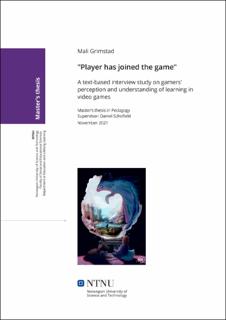| dc.contributor.advisor | Schofield, Daniel | |
| dc.contributor.author | Grimstad, Mali | |
| dc.date.accessioned | 2022-02-10T18:19:50Z | |
| dc.date.available | 2022-02-10T18:19:50Z | |
| dc.date.issued | 2021 | |
| dc.identifier | no.ntnu:inspera:94905304:9595426 | |
| dc.identifier.uri | https://hdl.handle.net/11250/2978328 | |
| dc.description.abstract | Denne studien forsøker å utforske hvordan gamere, folk som spiller videospill, opplever og forklarer sine læringserfaringer innen videospill. James Paul Gees (2003) teori om læringsprinsipper i videospill ble brukt som teoretisk rammeverk, sammen med et kort blikk på indre motivasjon og selvbestemmelsesteori (Deci & Ryan, 2000). Dette i et forsøk på å gjenkjenne mulige læringspotensial innen videospill primært lagd for underholdning.
For å finne gameres perspektiver og forklaringer på deres spillerfaringer, ble det lagd et tekstbasert intervju som siden ble delt som en spørreundersøkelse på nettet. Spørreundersøkelsen inneholdt for det meste åpne spørsmål som fritt kunne besvares av informantene, med så mye eller lite tekst som de selv ønsket å gi. Det ble totalt samlet data fra 133 informanter verden rundt.
Gjennom analysen av data ble mange av Gees (2003) prinsipper identifisert. Dataene ble så delt inn i 7 kategorier, hvor flere hadde underkategorier. Av disse 7 ble 3 presentert med Gees prinsipper. De resterende 4 ble presentert noe kortere og uten eksempler fra informantene.
I diskusjonen ble videospill funnet å være gode læringsmiljø i samsvar med Gees (2003) teori. Videospill ble dermed diskutert som potensielle læringsverktøy innen formell læring. Studien diskuterte også potensielle negative sider ved videospill underveis.
Til slutt ble studien oppsummert, og det ble kort redegjort for mulig videre forskning innen videospill og praksisen rundt fenomenet. | |
| dc.description.abstract | This study aims to explore how gamers, those who play video- and computer games, perceive and explain their own learning experiences in gaming. James Paul Gee’s (2003) theory on learning principles in video games was used as a theoretical approach, together with a brief look into intrinsic motivation and self-determination theory (Deci & Ryan, 2000). This in an attempt to recognize the learning potential within regular made-for-entertainment video games.
To find gamer’s perspectives and explanations for their gaming experiences, a text-based interview was made and released as a survey online. The survey consisted mainly of open questions that could be replied to by the informants’ discretion, with as much or little text as they wished to share. In the end data was collected from 133 informants from around the world.
Through analyzing the collected data, many of Gee’s (2003) learning principles were identified. Subsequently the data was split into 7 categories, with several possessing multiple sub-categories. Of these 7, 3 where presented with Gee’s principles. The remaining 4 were presented in shorter fashion and without examples from the informants.
In the discussion video games were found to be good learning environments, in concordance with Gee’s (2003) theory. Therefore, games were subsequently discussed as potential educational tools for formal learning. The study also briefly discussed potential drawbacks of video games in general.
At the end, the study was summarized and there was a brief speculation on where research on gaming and gaming practices could go from here. | |
| dc.language | eng | |
| dc.publisher | NTNU | |
| dc.title | “Player has joined the game”
A text-based interview study on gamers’ perception and understanding of learning in video games | |
| dc.type | Master thesis | |
